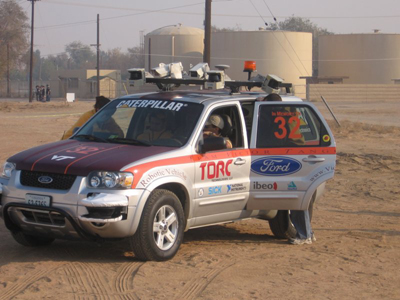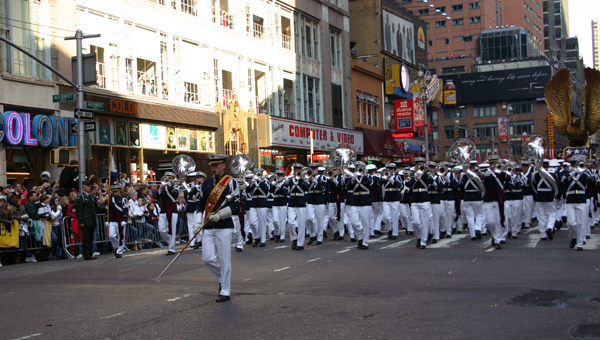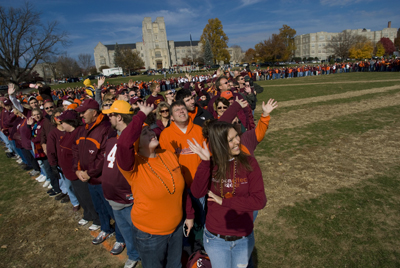|
|
Hokie Spirit monies distributed
In October, the university moved to the next stage of a long and difficult healing process by distributing the monies from the Hokie Spirit Memorial Fund to those most profoundly affected by the tragedy of April 16. Spontaneous donations to the university began almost immediately after the shootings on April 16, and by late summer, nearly 21,000 groups, companies, or individuals had contributed. "People sent this money to Virginia Tech and have entrusted to us to do what is right and appropriate," noted Tech President Charles W. Steger.
Checks totaling more than $8.5 million were distributed according to the protocols developed in conjunction with Kenneth Feinberg, administrator of the Hokie Spirit Memorial Fund. There were 79 eligible claimants; all applied and will be receiving funds or the equivalent educational tuition. Those disbursements are as follows: $208,000 to each of 32 families; $104,000 to each of 5 individuals; $46,000 to each of 8 individuals; and $11,500 to each of 34 individuals. Some will receive the disbursements over time in the form of free tuition. About $860,000 remains in designated funds created in the early days of the tragedy by the Virginia Tech Foundation, which established memorial funds in the names of the 32 victims. Contributions so designated were deposited in those funds and undesignated monies were deposited in the memorial fund and ultimately included in the distributions.
|
|
 VictorTango takes third in DARPA Urban Challenge VictorTango takes third in DARPA Urban Challenge

VictorTango, a team of Virginia Tech engineering and geography students, won third place and a $500,000 cash prize in the 2007 Defense Advanced Research Projects Agency (DARPA) Urban Challenge autonomous vehicle competition, held Nov. 3. Tech's autonomous vehicle, Odin, completed the 60-mile course in less than six hours. Odin crossed the finish line just behind the entries from Carnegie Mellon University, which won first place and $2 million, and Stanford University, which came in second for a $1 million prize.
During the Urban Challenge, vehicles were required to operate autonomously, with no human intervention allowed past the starting line, as they obeyed California traffic laws and performed such maneuvers as merging into moving traffic, navigating traffic circles, and avoiding obstacles. Only six of the 11 finalists finished the course; the other three were from Cornell University, Massachusetts Institute of Technology, and a collaborative team from the University of Pennsylvania and Lehigh University.
VictorTango converted an Escape hybrid SUV donated by Ford Motor Co. into an autonomous vehicle by outfitting it with a drive-by-wire system, a powerful computer system, laser scanners, cameras, and a global-positioning system. TORC Technologies LLC, a company in Virginia Tech's Corporate Research Center founded by alumni of the university's robotics program, worked with VictorTango to develop the navigational software, modeled on human behavior, for the vehicle's computer system. For more on VictorTango, including its team members and video of Odin, go to www.me.vt.edu/urbanchallenge/index.htm.
 Architecture ranks as nation's best Architecture ranks as nation's best
It's official: According to the Design Futures Council and the journal DesignIntelligence, Virginia Tech's School of Architecture + Design in the College of Architecture and Urban Studies offers the nation's best undergraduate architecture program. The school's graduate program also received acclaim, ranking fifth in the nation and first among all public universities. The rankings reflect the results of a survey targeting design partners, managing principals, and human resource directors in firms that have direct experience with the hiring and performance of architecture graduates. Collectively, these firms employ more than 100,000 people.
 Coal research fueled by Dominion | By donating $500,000 to the Virginia Center for Coal and Energy Research (VCCER) at Virginia Tech, Dominion, one of the nation's largest producers of energy, is bolstering efforts to keep carbon dioxide emitted by power plants from reaching the atmosphere. The gift also will make it possible for VCCER to qualify for additional funding from the U.S. Department of Energy. The center is planning a full-scale carbon storage demonstration project in Southwest Virginia that will span the carbon dioxide emissions management spectrum, which encompasses separation, capture, and sequestration. Currently, carbon dioxide, which is emitted by burning fossil fuels--including at power plants and in cars--is considered to be one of the primary human factors affecting global warming. VCCER's goal is to find ways to prevent carbon dioxide from being released into the air. Coal research fueled by Dominion | By donating $500,000 to the Virginia Center for Coal and Energy Research (VCCER) at Virginia Tech, Dominion, one of the nation's largest producers of energy, is bolstering efforts to keep carbon dioxide emitted by power plants from reaching the atmosphere. The gift also will make it possible for VCCER to qualify for additional funding from the U.S. Department of Energy. The center is planning a full-scale carbon storage demonstration project in Southwest Virginia that will span the carbon dioxide emissions management spectrum, which encompasses separation, capture, and sequestration. Currently, carbon dioxide, which is emitted by burning fossil fuels--including at power plants and in cars--is considered to be one of the primary human factors affecting global warming. VCCER's goal is to find ways to prevent carbon dioxide from being released into the air. |
|
|
 Spectacular season nets first College Cup play Spectacular season nets first College Cup play
|
|
|
Dave Knachel
|
|
|
|
|
|
|
The men's soccer team had its best season in school history, finishing at 14-4-5--for the best single-season record--and winning three matches in the NCAA tournament playoffs to advance to its first-ever College Cup appearance. On Dec. 14, the Hokies lost to No. 2 seed Wake Forest 2-0 in the semifinals. Although the match marked the ends of the careers of five seniors and several players from overseas, the team's leadership will remain strong. Head Coach Oliver Weiss, who has a career record of 68-39-16, was named Coach of the Year by the Virginia Sports Information Directors Association. |
|
 Concert to memorialize Musica Viva! founder | Longtime Virginia Tech librarian Marilyn Norstedt was a founding member of Musica Viva!, an organization created to bring chamber music and other performances by internationally acclaimed musicians to communities throughout Southwest Virginia. Norstedt, who died in 2003, will be remembered on Jan. 26 when the Marilyn Norstedt Memorial Concert hosts the Cassatt String Quartet, which has been acclaimed as one of the nation's outstanding ensembles. The concert will be sponsored by Norstedt's widower, Johann Norstedt, a retired English professor and member of the English department's alumni board. For more on the performance, go to www.musicaviva-swva.com/index.shtml. Concert to memorialize Musica Viva! founder | Longtime Virginia Tech librarian Marilyn Norstedt was a founding member of Musica Viva!, an organization created to bring chamber music and other performances by internationally acclaimed musicians to communities throughout Southwest Virginia. Norstedt, who died in 2003, will be remembered on Jan. 26 when the Marilyn Norstedt Memorial Concert hosts the Cassatt String Quartet, which has been acclaimed as one of the nation's outstanding ensembles. The concert will be sponsored by Norstedt's widower, Johann Norstedt, a retired English professor and member of the English department's alumni board. For more on the performance, go to www.musicaviva-swva.com/index.shtml.
 By 2010, student engineers should surpass $1 million in giving | If a student organization were allowed to become a member of the Ut Prosim Society, the Student Engineers' Council would be well on its way to membership in the level of the President's Inner Circle, comprised of donors who surpass the $1 million mark. During the past eight years, the Student Engineers' Council has contributed more than $400,000 in support of the College of Engineering's undergraduate programs. In addition, it supports three endowed scholarships and has returned tens of thousands of dollars to individual engineering student societies to support travel to conferences, hosting of national meetings, and inventory for design projects. The Student Engineers' Council earns the money it donates to the college by hosting the Engineering Expo career fair each year. In 1980, approximately 40 companies attended the Career Fair; today some 260 companies participate. Virginia Tech's Engineering Expo is one of the most successful career fairs in the country. By 2010, student engineers should surpass $1 million in giving | If a student organization were allowed to become a member of the Ut Prosim Society, the Student Engineers' Council would be well on its way to membership in the level of the President's Inner Circle, comprised of donors who surpass the $1 million mark. During the past eight years, the Student Engineers' Council has contributed more than $400,000 in support of the College of Engineering's undergraduate programs. In addition, it supports three endowed scholarships and has returned tens of thousands of dollars to individual engineering student societies to support travel to conferences, hosting of national meetings, and inventory for design projects. The Student Engineers' Council earns the money it donates to the college by hosting the Engineering Expo career fair each year. In 1980, approximately 40 companies attended the Career Fair; today some 260 companies participate. Virginia Tech's Engineering Expo is one of the most successful career fairs in the country.
 Virginia 4-H teams are tops | Two Virginia 4-H teams made names for themselves at the North American International Livestock Exposition held in November. The four-member Virginia 4-H Dairy Quiz Bowl Team took home the top honors at the Invitational 4-H Dairy Quiz Bowl, beating out 18 other teams, tying for second for all-time wins, and becoming one of only four state teams to have won more than once in the 28-year history of the contest. The Virginia 4-H Livestock Judging Team won first place at the National 4-H Livestock Judging Competition for the first time since 1983. Virginia's four-member team, one of 33 teams to participate, scored second place in sheep judging, third in beef cattle, sixth in swine evaluation, and fifth in oral reasoning on the way to its win. 4-H is supported by Virginia Cooperative Extension, which brings the resources of Virginia's land-grant universities, Virginia Tech and Virginia State University, to the people of the commonwealth. Virginia 4-H teams are tops | Two Virginia 4-H teams made names for themselves at the North American International Livestock Exposition held in November. The four-member Virginia 4-H Dairy Quiz Bowl Team took home the top honors at the Invitational 4-H Dairy Quiz Bowl, beating out 18 other teams, tying for second for all-time wins, and becoming one of only four state teams to have won more than once in the 28-year history of the contest. The Virginia 4-H Livestock Judging Team won first place at the National 4-H Livestock Judging Competition for the first time since 1983. Virginia's four-member team, one of 33 teams to participate, scored second place in sheep judging, third in beef cattle, sixth in swine evaluation, and fifth in oral reasoning on the way to its win. 4-H is supported by Virginia Cooperative Extension, which brings the resources of Virginia's land-grant universities, Virginia Tech and Virginia State University, to the people of the commonwealth.
|
|
|
|
|
There they were just a-marchin' down the street . . .
|
|
|
|
|
|
|
Cathy Coggin
|
|
|
|
|
The Virginia Tech Corps of Cadets' Highty-Tighties marching band, under the direction of Maj. George McNeill, strutted their stuff during the 80th Annual Macy's Thanksgiving Day Parade in New York City on Nov. 22. This was the Highty-Tighties' sixth appearance in the 2.5-mile parade through Manhattan. It was estimated that 2.5 million people watched in person and that another 44 million nationwide saw the parade on television. |
|
|
|
|
|
 |
|
|
|
|
|
|
Michael Kiernan
|
|
 |
|
On Nov. 17, a few thousand members of the Hokie community gathered on the Drillfield to send a message of thanks to the world for its overwhelming display of condolence and support after the April 16 tragedy. The event was recorded by ground and aerial photography as well as from space by the IKONOS satellite, which passed overhead at an altitude of about 420 miles. |
|
|
|
|
|
Kim Peterson
|
|
|
|
|
|
|
"The world came together for the Virginia Tech community and the Hokies Thank the World event provided a way to send out a message of thanks and love to all of the world," says Peter Sforza, coordinator of the event and faculty member in the Department of Geography in the College of Natural Resources. Sforza is also the coordinator for VirginiaView, a statewide remote-sensing consortium that promotes innovative applications of satellite imagery. To see the satellite image, go to www.vt.edu/thank_the_world. |
|

